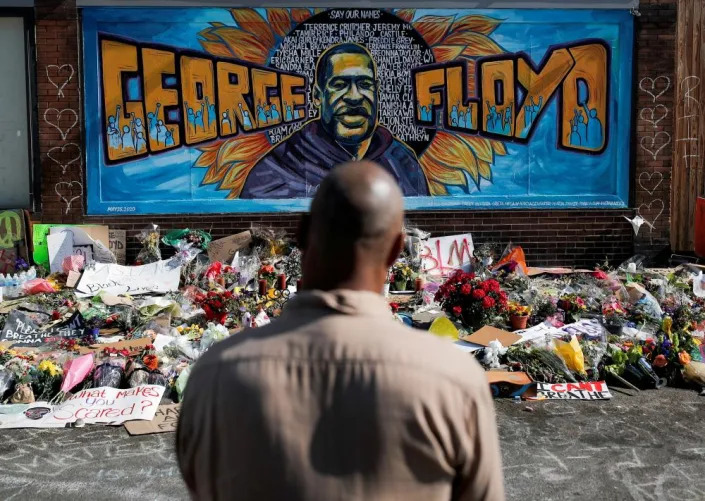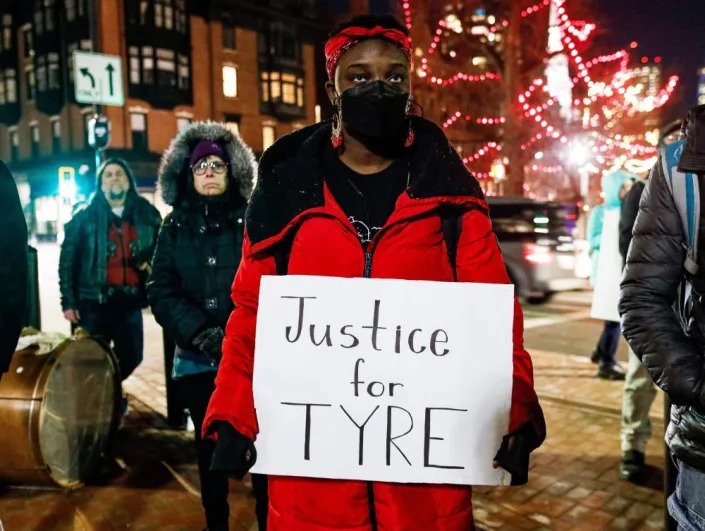Joan E Greve
THE GUARDIAN
Mon, February 6, 2023

Photograph: AFP/Getty Images
As RowVaughn Wells addressed the hundreds of mourners gathered to grieve the loss of her son, Tyre Nichols, she delivered an impassioned plea to Congress: pass the George Floyd Justice in Policing Act.
“We need to get that bill passed,” Wells said at Nichols’s funeral on Wednesday. “Because if we don’t, the next child that dies – that blood is going to be on their hands.”
Related: Family says son’s death shows pattern of Memphis police brutality: ‘System hasn’t changed’
Civil rights leaders have echoed those demands in the weeks since the killing of Nichols, a 29-year-old Black father who died last month after being brutally beaten by Memphis police officers during a traffic stop. Five officers have been fired and charged with second-degree murder in connection to Nichols’s death, and a sixth officer was fired on Friday.
The tragedy has also reinvigorated calls to address policing reform at the federal level. Ben Crump, the Nichols family’s attorney, has said that Sheila Jackson Lee, a Democratic congresswoman from Texas, plans to soon reintroduce the George Floyd Justice in Policing Act in the House of Representatives. The newest version of the legislation will include a “Tyre Nichols Duty to Intervene” provision outlining officers’ responsibility to act when they witness misconduct. But even in the wake of Nichols’s death, the divided Congress appears unlikely to pass the bill.
Here’s everything you need to know about the bill:
Mon, February 6, 2023

Photograph: AFP/Getty Images
As RowVaughn Wells addressed the hundreds of mourners gathered to grieve the loss of her son, Tyre Nichols, she delivered an impassioned plea to Congress: pass the George Floyd Justice in Policing Act.
“We need to get that bill passed,” Wells said at Nichols’s funeral on Wednesday. “Because if we don’t, the next child that dies – that blood is going to be on their hands.”
Related: Family says son’s death shows pattern of Memphis police brutality: ‘System hasn’t changed’
Civil rights leaders have echoed those demands in the weeks since the killing of Nichols, a 29-year-old Black father who died last month after being brutally beaten by Memphis police officers during a traffic stop. Five officers have been fired and charged with second-degree murder in connection to Nichols’s death, and a sixth officer was fired on Friday.
The tragedy has also reinvigorated calls to address policing reform at the federal level. Ben Crump, the Nichols family’s attorney, has said that Sheila Jackson Lee, a Democratic congresswoman from Texas, plans to soon reintroduce the George Floyd Justice in Policing Act in the House of Representatives. The newest version of the legislation will include a “Tyre Nichols Duty to Intervene” provision outlining officers’ responsibility to act when they witness misconduct. But even in the wake of Nichols’s death, the divided Congress appears unlikely to pass the bill.
Here’s everything you need to know about the bill:
What is the George Floyd Justice in Policing Act?
The George Floyd Justice in Policing Act is a federal bill aimed at reforming US police departments by cracking down on controversial tactics like no-knock warrants and making it easier to prosecute officers accused of violence.

A local resident stands in front of a makeshift memorial honoring George Floyd in Minneapolis, Minnesota. Photograph: Carlos Barría/Reuters
The bill is named after George Floyd, the 46-year Black man who was murdered by Minneapolis police officers in May 2020. The legislation would ban federal law enforcement officers from using chokeholds like the one that ended Floyd’s life, and it would require state and local police departments that receive federal funding to adopt the same policy.
State and local police departments that receive federal funding would be required to enforce a number of other policies as well – including providing officers with body cameras, establishing anti-discrimination programs and mitigating the use of deadly force.
Has Congress tried to pass the George Floyd Justice in Policing Act before?
Yes, the bill passed the House twice when the chamber was still controlled by Democrats, first in June 2020 and later in March 2021. The bill passed almost entirely along party lines both times, as most Republicans opposed the legislation, and stalled in the Senate.
After the House passed the bill again in 2021, two Democratic lawmakers – then congresswoman Karen Bass of California and Senator Cory Booker of New Jersey – engaged in talks with Tim Scott, a Republican senator from South Carolina, to try to craft a bipartisan compromise on the legislation.
Those negotiations broke down in September 2021, as the three lawmakers conceded that they could not reach agreement on a few crucial provisions.
Booker said at the time: “After months of exhausting every possible pathway to a bipartisan deal, it remains out of reach right now.”
Why did the bipartisan talks fall apart?
The conflict appeared to center on the issue of “qualified immunity”, a legal principle that shields police officers from civil liability for misconduct.
Democrats and civil rights activists have called for restricting the use of qualified immunity to ensure that police officers can be held accountable when they are accused of breaking the law. That policy was included in the version of the George Floyd Justice in Policing Act that passed the House.
The proposal has drawn sharp criticism from Republicans and law enforcement groups, who say that ending qualified immunity would have a detrimental effect on police departments’ recruitment efforts.
Will Congress pass the George Floyd Justice in Policing Act now, in response to the killing of Nichols?
Crump said at Nichols’s funeral that Lee plans to reintroduce the bill after Joe Biden delivers his State of the Union address on Tuesday.
But the bill is unlikely to pass the House again, given that the chamber is now controlled by Republicans. Congressman Jim Jordan, the Republican chair of the House judiciary committee, expressed skepticism that the bill would prove effective in preventing police violence.

Protesters hold slogans during a rally for Tyre Nichols in Boston, Massachusetts, on 2 February. Photograph: Xinhua/REX/Shutterstock
“I don’t know that there’s any law that can stop that evil that we saw,” Jordan said in response to the video of Nichols’s beating at the hands of the Memphis police.
Democrats have fiercely rejected that argument, calling for a renewal of bipartisan negotiations over the George Floyd Justice in Policing Act.
“I think [Booker] and Senator Scott should sit down again quickly to see if we can revive that effort,” said Senator Dick Durbin, the Democratic chair of the Senate judiciary committee.
Scott said he “never left the table” when negotiating policing reform and instead accused Democrats of failing to compromise.
“We should have simple legislation that we can agree upon, that has been agreed upon in the past,” Scott said last week. “But too often too many are too concerned with who gets the credit.”
If Congress does not act on policing reform, what can Biden do?
Biden has already signed one executive order to address policing reform, which incorporated some of the elements of the George Floyd Justice in Policing Act.
The order required all federal law enforcement agencies to participate in a new database tracking allegations of misconduct and mandated new agency standards to limit the use of force. The agencies’ officers were also required to wear body cameras and were prohibited from using chokeholds on suspects.
But civil rights leaders say the order does not go far enough to address the issue of policing reform, particularly because the policy only applies to federal officers.
“The vast majority of the challenges we have with policing are local,” said Rashad Robinson, president of the racial justice organization Color of Change. “That’s why there has to be a deeper level of federal oversight and accountability that we get through legislation.”
The White House has echoed that sentiment. Hours before the video of the police beating of Nichols was released, press secretary Karine Jean-Pierre told reporters that Biden did “everything that he could with the tools that he had” on policing reform.
As activists push for nationwide change, Robinson’s group is simultaneously taking action at the local level to seek justice for Nichols. Color of Change is circulating a petition calling on the Memphis city council to end the practice of pretextual stops and fund a civilian response unit.
Even if the city of Memphis adopts those policies, federal legislation to change policing across the entire US remains crucial, Robinson said.
“So much needs to be done at the local level,” he said. “The challenge here is that, if we don’t have change at the federal level, we don’t get to the true power of civil rights because we then still end up with a patchwork of changes that doesn’t make for an equal experience.”
The Guardian’s Lauren Gambino contributed reporting
No comments:
Post a Comment